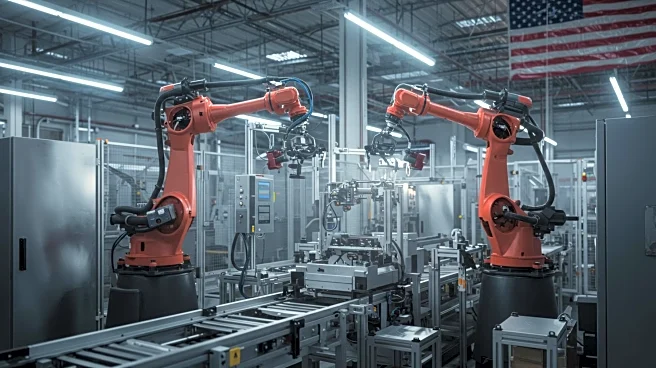What's Happening?
GE Appliances, owned by Haier, has announced a significant investment of over $3 billion in its U.S. operations over the next five years. This move comes in response to tariff policies implemented by the Trump administration, which aim to boost domestic manufacturing. The investment will create 1,000 jobs across five states and focus on expanding the company's air conditioning and water heating portfolio. Additionally, GE Appliances plans to modernize its 11 U.S. manufacturing plants with new automation and capital equipment. This initiative follows similar actions by other companies, such as Carrier Global, which announced a $1 billion investment in U.S. manufacturing earlier this year.
Why It's Important?
The investment by GE Appliances is a direct response to the Trump administration's push for increased domestic production and job creation. By investing in U.S. manufacturing, GE Appliances is contributing to the strengthening of the American industrial sector, potentially leading to increased economic growth and job opportunities. This move also reflects a broader trend among global firms to enhance their presence in the U.S., which could lead to a more competitive manufacturing landscape. The creation of 1,000 jobs will have a positive impact on local economies in the states where GE Appliances operates, supporting community development and economic stability.
What's Next?
As GE Appliances implements its investment plan, the company will focus on expanding its product offerings and modernizing its manufacturing facilities. This could lead to increased production capacity and efficiency, allowing GE Appliances to better compete in the global market. The investment may also prompt other companies to follow suit, further boosting U.S. manufacturing. Stakeholders, including local governments and industry leaders, will likely monitor the progress of this initiative to assess its impact on the U.S. economy and job market.
Beyond the Headlines
The investment by GE Appliances highlights the ongoing influence of tariff policies on corporate strategies. It underscores the importance of government policies in shaping business decisions and the potential for such policies to drive significant economic changes. Additionally, the focus on automation and modernization reflects the industry's shift towards more technologically advanced manufacturing processes, which could lead to long-term shifts in workforce requirements and skills.









